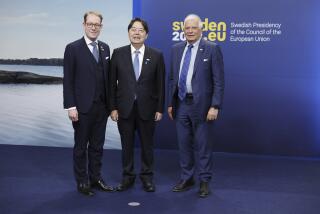Japan’s premier aims to strengthen ties on visit to China
- Share via
TOKYO -- — Two weeks after China commemorated the 70th anniversary of the infamous horrors perpetrated in Nanking by occupying Japanese troops, Japanese Prime Minister Yasuo Fukuda is heading to Beijing for a four-day visit, invoking an impending anniversary with happier connotations.
The coming year will mark the 30th since the signing of the Japan-China Treaty of Peace and Friendship, Fukuda reminds audiences. And he rattles off talking points to show how far the relationship has come: the 5 million people who travel between the two countries annually; and the deepening economic integration that has made Japan the biggest foreign investor in China, while turning China into Japan’s biggest trading partner.
The treaty is also special to Fukuda because it was signed when his father, Takeo, was prime minister. The elder Fukuda is remembered as the prime minister who shifted Japanese foreign policy toward Asia, delivering a speech that pledged to make Japan a good neighbor and undertaking initiatives that brought a greater Asian component to Tokyo’s Washington-centric diplomatic relations.
Since taking power in September, his son has signaled that the father’s pro-Asian doctrine is very much alive.
The younger Fukuda, 71, will be among friends in China, where his family name produces a warm welcome, and he has long-cultivated friendships at the top levels of the Communist Party.
“The prime minister has many old friends in China, and the primary purpose of the visit is to reconfirm those personal relationships and trust,” said his spokesman, Hiroshi Suzuki.
Fukuda will meet with President Hu Jintao and Premier Wen Jiabao, and make a symbolic visit to Qufu, the reputed birthplace of Confucius, whose philosophy is shared by both China and Japan.
Fukuda is also expected to help coordinate the timing of Hu’s much-anticipated return visit to Japan in spring, the next step in a series of meetings aimed at getting the often-fraught relationship into working order.
--
Good timing for China
Having a sympathetic Japanese politician in power is a welcome development for a China in an Olympics year that will bring extra scrutiny, especially for its human rights policies and environmental record. Fukuda presents an opportunity to stabilize relations after the tenure of his predecessor, Shinzo Abe, who sent conflicting messages to Beijing, never sure whether to bring Japan closer to China or build alliances to contain it.
Even under Abe, the atmosphere was not nearly as toxic as during the latter half of Junichiro Koizumi’s premiership, when angry arguments over what the Chinese saw as Japan’s lack of repentance for wartime atrocities led to a freeze on high-level contacts after 2003.
Those clashing views of history have not been resolved so much as politely shelved for the moment. Japanese officials say Fukuda will not address historical issues in any significant way during his visit. The aim, they say, is to give a boost to economic and cultural contacts that are deepening at a rapid pace.
Even as Fukuda left Tokyo on Wednesday, his officials were still working on details of what Japanese media reports say will be a $1.8-billion joint environmental fund that would help Chinese businesses clean up wastewater and emissions. The fund also would in effect restore at least a portion of Japan’s onetime massive foreign aid to China, which Fukuda’s predecessors had slated to be eliminated by next year.
Japanese officials say the leaders also will discuss progress on the multinational deal to get North Korea to give up its nuclear weapons program. And agreements may be signed on energy issues, though no deal is expected yet on the disagreement over control of undersea energy resources in contested waters of the East China Sea.
Fukuda is mostly hoping to show the Chinese that Japan is capable of being a partner as well as a rival. He already has demonstrated his acute awareness of Chinese sensibilities, breaking with other world leaders, including President Bush, by giving frosty treatment to the visiting Dalai Lama last month.
With Bush in attendance, the exiled Tibetan leader was awarded the Congressional Gold Medal in October, a move that infuriated Chinese leaders who oppose giving the Dalai Lama high-profile platforms for promoting Tibetan independence from China.
In Japan, by contrast, not a single senior government official met the Dalai Lama.
--
Pressure at home
But Fukuda’s ability to keep Japan on a pro-China course depends on whether he can turn around his fortunes at home. His governing Liberal Democratic Party still has a strong constituency that holds views of China ranging from wary to hostile, and the nationalist crowd has been snidely suggesting that Fukuda’s offer of billions of yen in environmental aid is a sign that he is making the pilgrimage to Beijing on his knees.
Fukuda’s grip on power is tenuous. He faces an upper house of parliament controlled by the opposition Democratic Party of Japan and its feisty if unpredictable leader, Ichiro Ozawa. The DPJ smells blood, with polls showing the government’s approval rating tumbling -- down 11 points since November -- mainly over its bungled handling of lost pension records that has left millions wondering whether they would ever receive a state pension.
The bright spot for Fukuda is that he has largely avoided personal blame for the government’s fumbles. If he averts a spring election, he will be able to welcome Hu to Japan for a visit that many here see as a chance to turn the improved relationship into more tangible gains.
And that, the Fukuda doctrine contends, is good for regional stability and prosperity.
“It’s not only Japanese people who want good relations with China,” said Fukuda spokesman Suzuki. “When Sino-Japanese relations are good, it is a source of reassurance for other countries in Asia too.”
--
More to Read
Sign up for Essential California
The most important California stories and recommendations in your inbox every morning.
You may occasionally receive promotional content from the Los Angeles Times.













